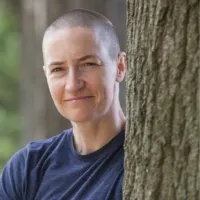Podcast
The Rub: a Healwell podcast about massage therapy
Join Healwell in examining and bringing context to the world of massage therapy beyond the table. We have ideas. We have opinions. We want change, and that will only come with an understanding of who and what massage therapy truly is.
A variety of topics are up for grabs: history, philosophy, development, and all the other shiny things that fascinate us.

Love Thy Client
We have heard from a handful of therapists over the last week about the difficulty they are experiencing when it comes to clients who voted differently than they did. Many therapists are struggling with their own very human emotions and fears as they try to meet the people they serve with love and care.
As one therapist put it, “How can I touch someone I no longer trust?”
My friends. I hear this and I feel this. Deeply. And I want you to know that it is, indeed, possible to continue to work with and even to love people who voted differently than you did. You still may decide not to do it and that will ultimately be your choice to make. I’m not here to tell you what you “should” do.
As you feel through this, I’d like to offer a few invitations for you to consider.
First, there is a question of boundaries that must be addressed here. If you want your treatment space to be a place where discussions of politics are not welcome, you’ll need to be clear about that. Perhaps you send a thoughtful email to your clients. Maybe you put a sign on your door or somewhere (or multiple somewheres) in your treatment room indicating that this is a politics-free space. You may even find that you want to share with your clients, using your words straight from your own mouth, that you’d like to be able to focus on the concerns that have brought them to your table and, as a result, you would like to join them in an agreement to keep any conversation free of politics.
When you place these boundaries, two outcomes are likely.
Some clients will self-select out of your practice. They will either read the writing on the wall that your politics and theirs don’t align or, if they feel that discussing politics is part of how they unwind during a session, that makes the two of you a poor match.
People will simply honor your request and you will be more able to see them for the human they are – a human who is in pain, who wants to find some peace, or who simply enjoys the multi-faceted wonders of massage therapy and what their time with you does for their mind, body, and soul.
And certainly, you are well within your right to ask any client who says overtly hateful or harmful things to refrain from doing that, and to not return to your practice if they persist. For safety, you may want to invite them not to return to your practice via email or phone after the session is over and they are no longer in your treatment space. Only you can know what will support you and only you can know your own capacity for discomfort.
But boundaries are only part of what’s happening here.
It’s far too easy in the current social climate to assume and to truly feel that some people are for you and some people are against you. The truth is most people are for themselves. They’re not even thinking about you, or anybody else, enough to bother to be against you. They are for comfort and a sense of safety and they are for having enough of whatever it is they feel they need and they are about all of those things for “their” people.
This is true of all of us. Even you.
We must remember that what’s true for every single one of us is this:
Our experience is shaped by our experience.
and
Our experience is, thus, limited by our experience.
We love what we know. We protect and defend it, often with a textbook ignorance about how that protection and defense impacts things and people we don’t know, or don’t know well. This means that while you can’t “trust” some clients to vote the way you would vote or to see the world as you see it, you can trust the person on your table to be just like you in some very essential ways.
Anger is not the only emotion any of us are feeling. We minimize ourselves and our experience when we pretend it is. A very wise person once said, “Angry is Sad’s bodyguard.” Underneath sadness and anger, if we’re willing to look, we generally find tenderness and wounding.
Maybe you are feeling sad because you feel let down. Maybe you are feeling the grief of loss. Perhaps you are feeling betrayed because the world simply didn’t do what you wanted it to do. It’s possible you feel overwhelmed, scared, claustrophobic, and panicked because things are uncertain. Those feelings can quite naturally lead to feeling angry… because you’d really rather not be feeling the very natural and deeply nuanced array of human experience.
Please allow all of the feelings. Perhaps not while you’re in your treatment room, but make space for them. See them. They are deeply wise, important, and instructive. And they are more honest and accurate than the anger that tries to cover them up. When you make time and space for them outside the treatment room, you’ll find you’re much better able to manage them when they do come up in session.
When you do this, you are also likely to find that there is still room for other feelings, like the ability to see your clients as humans with bodies and souls in need of love and care.
Regardless of which way you voted or why you think it went the way it went, part of what is happening in the not-so-United States is the result of our willingness to dehumanize each other. We have reduced ourselves to two, overly simplified groups. We’re red or blue. We love people or we don’t. We care about community or we don’t.
I invite you to step away from this deeply harmful view. It’s a delusion intended to separate us. When we are separate – when we imagine we are not connected – we are weak and distracted. Don’t be fooled by the lie that some of us are good and some of us are not. That some of us are against love and some of us are for it. If humans were that simple, we would not be having this conversation.
Certainly there are commonalities within each group, but there are also commonalities between groups.
This sense that we are not able to trust people who feel and think differently than we do is a dehumanizing delusion. Certainly, humans tend to prefer other humans who share their world view and perspective. We imagine that we are safer with people who (we think) see the world the way we do, but the complacency that happens in these bubbles of similar thought and emotion are as potentially harmful as what feels like the obvious danger of difference.
We mistake comfort and sameness for safety.
Many of us know what it is to feel “safe” in what are, objectively speaking, deeply harmful situations. We feel a sense of comfort because we know what to expect, even if what we expect is harmful or disconnected. Think back to relationships that have ended. When you look back on some of them, you wonder what you were thinking and why you allowed someone to treat you “that way.” I’m talking about marriages, maybe your childhood home, perhaps teams on which you have played, or bosses for whom you have worked.
Safety and agreement are not the same. When you are in the presence of someone who disagrees with you, that does not mean you are not safe or that this person is untrustworthy.
There is work to do inside ourselves. Work that will facilitate access to our endlessly expansive hearts and minds. Work that will allow us to continue to do the work we love, without the need for every client to be aligned with our world view, whatever it may be. We must each consider our role in this creeping polarization that is so dangerous to the future of community and healing. It is not only our hands that do the healing in this work or in this world.
Interdisciplinary
Interdisciplinary is a podcast about people who take care of people and all of the places and perspectives that lift us up. We love science, we love meaningful dissent, and we love to support our fellow human beings in creating a world that is just, equitable and loving beyond our own imagining.
We will be joined by compassionate, self-aware humans who are actively participating or are interested in participating in interdisciplinary care to have honest, uncomfortable conversations about topics like access, racism, death, ageism, ableism, and equity that address the intersection of being a human being and providing quality care, so that we can expand our impact, confidently navigate new challenges, and together create lasting, sustainable changes in healthcare.
You’ll always learn something. You’ll always laugh and you’ll come away better informed and with real things you can do in your own community and practice to create a more compassionate and collaborative system of care for all humans.
Connect With Us:

Contact Us:
2300 Wilson Blvd., Suite 700
Arlington, VA 22201
